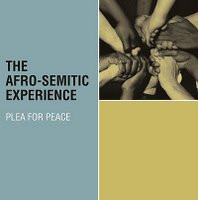The Afro-Semitic Experience
... kicks ass.
I wrote a review of their latest CD, Plea for Peace, a little while back, but it's not going to run in The Advocate -- so enjoy it here!
You can find more info about ASE at bassist David Chevan's website: http://chevan.addr.com/

The Afro-Semitic Experience
Plea for Peace
(Reckless DC Music)
I’ve had a while to sit on ASE’s latest LP—and that’s a good thing, because Plea for Peace raises a bevy of questions. At the top of the list was whether or not the intersection between African and Jewish musical traditions was fertile enough to merit a fourth ASE album. Were these cats really on to something, or was it merely a gimmick that would expire if one ceased to consider the band’s name, the players’ races and religions? The album’s title felt fraught as well—especially in this time of international conflict. How would a “plea for peace” translate musically? And would that plea be clear to the average listener without forcing them to consult Cliff’s Notes on the connotations behind each piece?
Two facts become apparent after repeat listens. First, the playing on the album is immensely skilled, and, in its best moments, infectiously joyous. Second, between the disc’s ultra-hi-fi production and the spotless, over-rehearsed feel of the pieces, the first half of Plea for Peace retains a scholarly inflexibility, suggesting that this musical Voltron may find its origin in academic junctures, rather than organic ones. I found myself thinking the whole endeavor might be more aptly (if less poetically) titled Plea for Cooperation, since, by a stroke of Orwellian logic, the stuffy, unilateral peace suggested in the first tracks is just as creepy as unilateral war (if not more so).
But the theme of peace as a living, tenable concept finally rings true beginning with track 5—the sonorous “Introduction to A Song for When the Temple is Rebuilt.” Not coincidentally, this track features the album’s first musical acknowledgement of malice. With the introduction of an antagonist, peace—hitherto abject and abstract—springs to life full of pathos and rugged desire. The “Song” that follows offers substantive suggestions for conflict resolution. The track’s reliance on a hand percussion backbeat, rather than a traditional jazz drumkit, suggests that the work of “rebuilding” is human, practical, graspable. And Stacy Phillips’ guitar solo traverses angular Eastern scales that meld with the African-flavored percussion while retaining a foreign dignity. Respectful integration is the key.
Thankfully, it is this idea of peace that illuminates the latter half of the album. If “Song” is the centerpiece of the album, the title track is the capstone—an absolute jazz victory that was undertaken as a rehearsal, and ended up being the final take. Warren Byrd’s form is unmatched as he channels mellifluous piano work from some beautiful otherworld. And David Chevan’s bass solo is the very heart of the album—for in it, the “plea” finally reveals itself not to be one founded in desperation or simplistic idealism, but rather in vulnerability, in the human needs for love, safety, and warmth that bind us into a community.
No comments:
Post a Comment